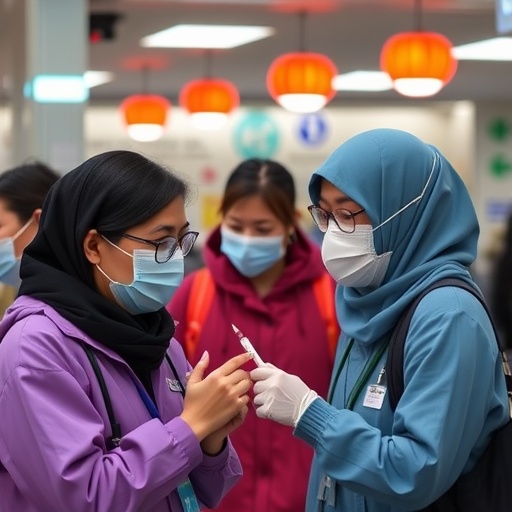In the realm of infectious disease prevention, vaccination stands as a cornerstone of public health strategy. Yet, the effectiveness of vaccine deployment hinges not solely on availability but significantly on the attitudes of healthcare workers who are on the frontline of vaccine administration. A recent study published in Global Health Research and Policy sheds critical light on the perspectives of healthcare workers in China regarding influenza vaccine prescriptions, revealing nuanced insights into the factors shaping vaccine advocacy in clinical practice.
Influenza vaccination is recognized globally as a vital intervention to reduce the morbidity and mortality associated with seasonal flu outbreaks. However, healthcare workers’ attitudes toward these vaccines can vary considerably, influenced by a spectrum of personal beliefs, institutional policies, and socio-cultural contexts. The study led by Cao, Y., Wang, Q., Zhao, J., and colleagues employed a robust methodological framework to assess these attitudes within China’s diverse healthcare landscape.
China’s healthcare system encompasses a vast network of professionals who play a pivotal role in public health outreach. Understanding their engagement with influenza vaccination programs is crucial, especially given the country’s population size and the global implications of its disease control measures. The researchers utilized a comprehensive questionnaire assessing knowledge, perceptions, and intentions related to influenza vaccine prescriptions, achieving representative data from multiple regions.
One of the critical revelations of the study is the variability in healthcare workers’ confidence in the safety and efficacy of the influenza vaccine. While a substantial proportion recognized the clinical benefits, concerns persist about potential side effects and vaccine effectiveness, frequently fueled by misinformation and gaps in continuing medical education. This ambivalence has tangible consequences for vaccine uptake rates among both healthcare staff and the patients they serve.
Furthermore, the study highlights the influence of institutional support and policy frameworks on prescription behaviors. Healthcare workers operating within facilities with strong organizational endorsement for vaccination demonstrated higher prescription rates, underscoring the need for systemic reinforcement. Training programs and official guidelines were identified as pivotal factors bolstering healthcare workers’ willingness to proactively recommend influenza vaccines.
Intriguingly, the research also delved into the role of personal experiences and peer influence. Healthcare professionals who had witnessed influenza-related complications firsthand or had themselves received vaccines exhibited more positive attitudes. Conversely, skepticism within peer groups was found to propagate hesitancy, suggesting that social dynamics within medical teams can either facilitate or hinder vaccine promotion.
The complex interplay between knowledge, attitudes, and practice uncovered by the study points to the necessity of multifaceted intervention strategies. Targeted educational campaigns tailored specifically for healthcare workers could address misconceptions while promoting evidence-based understanding of vaccine benefits. Such interventions are especially timely, given the overlapping challenges posed by concurrent respiratory illnesses such as COVID-19.
Another dimension addressed is the urban-rural divide in healthcare delivery and attitudes. Workers in rural settings frequently encountered logistical barriers to vaccine access and possessed less exposure to updated clinical guidelines, which translated into lower prescription rates. This geographic disparity highlights an equity issue that demands attention in national vaccination policies to ensure that influenza prevention reaches all population segments effectively.
The researchers also underscore the significance of communication skills in influencing patient acceptance of vaccines. Healthcare workers equipped with effective strategies for discussing vaccine benefits, countering myths, and empathizing with patient concerns were more successful in encouraging immunization. This aspect underlines the importance of integrating communication training into professional development curricula.
Behavioral theories and models, such as the Health Belief Model and Theory of Planned Behavior, were referenced in framing the analysis, offering a theoretical foundation to understand and predict healthcare workers’ vaccination-related behaviors. Such frameworks can guide the design of interventions that align with intrinsic motivations and external pressures shaping clinical decisions.
From a public health policy perspective, the findings present actionable insights. Authorities are urged to engage healthcare workers as pivotal partners in vaccination campaigns, ensuring they are well-informed, motivated, and supported both structurally and professionally. Emphasis on continuous medical education, accessible vaccine supplies, and integrated health systems can collectively drive improved vaccine prescription practices.
The study’s implications transcend influenza, bearing lessons applicable to broader immunization efforts, including emerging vaccines for novel pathogens. The frontline role of healthcare workers as trusted advisors and implementers of vaccination strategies positions them as gatekeepers of community health resilience.
In conclusion, this seminal investigation into healthcare workers’ attitudes toward influenza vaccine prescriptions in China casts a spotlight on both challenges and opportunities. It underscores the complexity behind vaccine decision-making within clinical settings, influenced by a mosaic of knowledge, beliefs, institutional context, and social dynamics. Addressing these factors through targeted education, policy support, and systemic reforms holds promise for enhancing influenza vaccination coverage and, by extension, public health outcomes in China and beyond.
Given the critically urgent need for robust immunization programs amidst ongoing and future respiratory disease threats, insights from this study offer a roadmap to harness the power of healthcare workers as catalysts for positive health behavior change. As influenza viruses evolve and pose continuous challenges, empowering those at the healthcare frontline with the right tools and attitudes is paramount in safeguarding population health.
Subject of Research: Healthcare workers’ attitudes toward influenza vaccine prescriptions in China
Article Title: Healthcare workers’ attitudes toward influenza vaccine prescriptions in China
Article References:
Cao, Y., Wang, Q., Zhao, J. et al. Healthcare workers’ attitudes toward influenza vaccine prescriptions in China. glob health res policy 10, 34 (2025). https://doi.org/10.1186/s41256-025-00430-0
Image Credits: AI Generated




